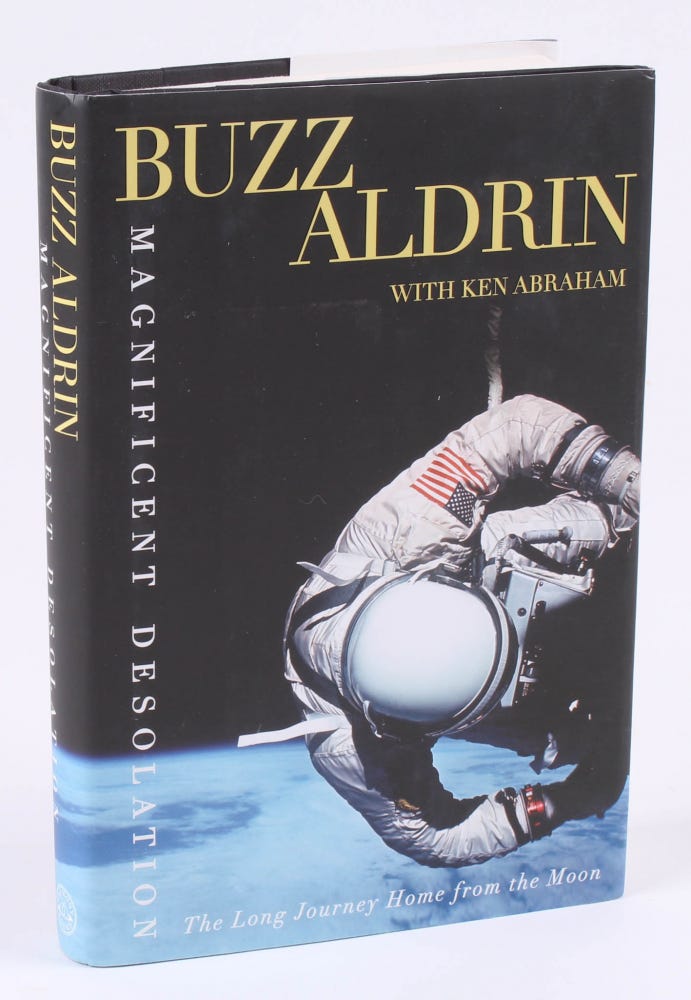Over the last few years, I’ve slowly been collecting books about space exploration and the early days of NASA and it’s Mercury, Gemini and Apollo programs. I’m not sure why, but this is something that I’ve always been interested in learning about since a young age. One book I found about a year and half ago at a used bookstore was this memoir by Buzz Aldrin titled Magnificent Desolation: The Long Journey Home from the Moon.
My first reaction is that this book was not what I had expected to be. It starts off in a pretty traditional way compared to other astronaut memoirs with Aldrin recounting what it was like to land on the moon and spend time there. One of the well-known phrases he used to describe his experience of being on the moon was the phrase “magnificent desolation”. After he came back from the moon this phrase also began to take on another meaning and he quickly began to develop relationship problems and struggles with depression and alcoholism. “Magnificent desolation” began to be a pretty accurate descriptor of his own life as he struggled to find meaning after achieving something as great as being the second human in history to ever set foot on another celestial body. In the midst of all these struggles Aldrin tried to advocate for other people who also struggled with these issues, and he did it at a time in history when many people were skeptical of the validity of mental health issues. Yet even though advocating for mental health support might have hurt his career and made him unpopular he continued on and never stopped, and the result was that he was able to use his popularity to raise awareness for people who did not have a lot of resources to go to for help.
One takeaway from this part of the book that came to mind was that no matter how great of an achievement a person might make in their life, it doesn’t inherently mean that they are going to be satisfied or that they aren’t going to struggle as a result of that great achievement. While Aldrin’s desire to be an astronaut and go to the moon may have been a noble and brave desire, that didn’t stop him from experiencing severe hardships as a consequence. Humans often fall into the trap of seeking meaning through trying to make a name for themselves or gaining status. Aldrin’s story is a good reminder that achievements and status should not be one’s only goals in life and that there is greater meaning to be found in making a positive impact on the lives of others and pursuing good relationships.
Another interesting aspect of this book was that it gives readers a good perspective of the mindset that many people had toward space exploration in the 80s and 90s and how that mindset has changed so much in recent years. In the final 4th of Aldrin’s book, he talks a lot about how the future of space exploration lies in tourism. He advocates for the creation of hotels in space and for space travel to be set up in a way similar to commercial airline travel. He also is a huge advocate for establishing permanent bases on the moon and on Mars. Not only that, but he expected all of this to be achieved within the last 10-20 years. I think it’s interesting how even though all of this seemed perfectly feasible 20 years ago, none of it has happened and the steps toward making these things happen have been very small. It was very interesting to read these perspectives from Aldrin and how they compare to the reality of what is happening in space exploration today.
If you enjoy reading about space exploration you may enjoy reading this book, but as I said, this book is less about space and more about Aldrin’s struggles after coming back from the moon. As someone who is very interested in psychology, I still enjoyed it a lot for the psychological elements of the story as well as the perspectives on space travel.





I especially appreciated your explanation of the title regarding Buzz Aldrin's personal struggles. There was also a bit of encouragement as you stated, "there is greater meaning to be found in making a positive impact on the lives of others and pursuing good relationships." Thanks for sharing your insights.